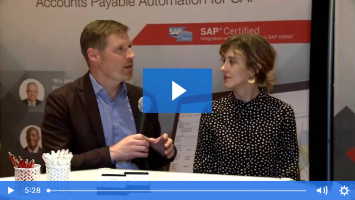Live from SAPinsider Studio: Invoice-to-Pay with SAP S/4HANA and Ariba
Friederike Hertenstein of SAP Breaks Down Invoicing for the Digital Enterprise
Friederike Hertenstein, Director, Accounts Payable, SAP Solution Management Finance, visited with SAPinsider Studio at the 2016 SAPinsider Financials event in Las Vegas to discuss Invoice to Pay and Sourcing to Pay processes in SAP S/4HANA Finance and the importance of integrating invoicing with the Ariba Network.
This is an edited transcript of the discussion:
Ken Murphy, SAPinsider: Hi, this is Ken Murphy with SAPinsider. I am at the SAPinsider Financial 2016 event in Las Vegas. Today I am pleased to be joined by Friederike Hertenstein, who is the Director, Accounts Payable, SAP Solution Management Finance. She is here today to talk to us a little bit about Invoice to Pay and Sourcing to Pay processes. Friederike, thank you for being with us today.
Friederike Hertenstein, SAP: Thank you Ken for inviting me.
Ken: I was hoping to start, if you could address just how the speed of business today and having more robust networks of partners and vendors changes the thinking surrounding sourcing to pay processes?
Friederike: I think we’ve had a lot of changes the last few years in this area; first it was all about optimizing the processes internally, so really getting everything done and automated as much as possible. And then the company starts thinking about having a better communication with their customers which means with their suppliers, so it was getting more and more important to optimize the communication outside the company.
Ken: How does SAP S/4HANA Finance help companies meet the need for more dynamic sourcing to pay processes?
Friederike: If we talk about dynamics, it’s a lot about automation and optimization but it’s also a lot about really getting the insights in real-time so that I can react dynamically. So it’s very important that the accounts payable manager has the real-time information so that reaction can be really as fast as possible. That’s one side of the house. And I think the other side of the house is also the optimization and collaboration with the customers.
Ken: To that end, how important is the integration with the Ariba network just as far as arriving at a modern invoice to pay process?
Friederike: When we talk about modern invoice to pay processes and also about the digital economy then I would say the integration into the Ariba Network is not an option, it’s really a must-have for every company to optimize the invoice to pay process and to really get the reconciliation automated as much as possible. And make it fast as much as possible. And before, Accounts Payable would always do my “mess for less” so we talked a lot about that, and now it gets more and more being really a value-creator within the company. It creates value for the company for example you can use your cash optimized as much as possible, and that helps when you have all this real-time data and when you have the real-time integration also into the Ariba Network.
Ken: You said that (Ariba) is a must-have. Can you touch on a couple of the key benefits of streamlining the invoice-to-pay processes in the Ariba Network?
Friederike: Actually in the Ariba Network you have a lot of automation already in place and also reconciliation, and it makes the communication between the buyer and supplier very smooth and easy because it’s all connected and they can really cooperate very fast and easily and they always have the insights on both sides, so the buyer and the supplier always know where the process is on which level and they get the insights – just one example, the supplier they do not have to call the buyer and ask for the status of the invoice, they just connect to the Ariba Network and there they get all the information about the invoice status. And that’s a great benefit.
Ken: Something companies struggle with is invoice exceptions; how are those handled in S/4HANA and how does that differ from traditional invoice exceptions?
Friederike: Yes, well I would say the Ariba Network as I mentioned is already reconciling a lot of the invoices so most of the invoices which are coming through the network into the digital core of S/4HANA Finance are already reconciled so that’s where automation is really coming into place. But then if you have other invoices in the S/4HANA system for example which are not coming from the Ariba Network you can add with our partner solution from OpenText, it’s SAP Invoice Management; you can really add the last piece of reconciliation to make it even more automated and smoother, and you have the real-time data so your reconciliation is really on real-time and that’s a huge benefit.
Ken: Friederike, thank you for joining us today.
Friederike: Thanks Ken for inviting me.








